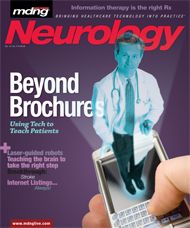Publication
Article
MDNG Neurology
Social Media Notebook: Oh, the Online Places You'll Go... or Not!
Social Media Notebook
Gwenn Schurgin O’Keeffe, MD, FAAP
Have you heard about Facebook Places? It’s Facebook’s addition to a cluttered landscape that is already populated by many, many other social networking geolocation applications such as Gowalla, Whrll, and Loopt.
You can’t get too far using any application on your iPhone without a screen popping up and asking whether you want to allow that application to use your location. If you hit “allow,” your location will then get tagged to whatever it is you are doing… posting, tweeting, or geolocating.
I typically hit “Don’t Allow” when I receive these prompts. To date, I haven’t tried any of the other geolocation networks listed in the opening paragraph (although I see that many of my friends do). I have resisted using these services for several reasons:
Privacy
I desire a clear boundary between my online and offline lives. If I want my friends and followers to know where I am for a specific reason, I’ll post that information in my status update. For example, I often do this when I’m attending a conference so as to let acquaintances and contacts in that city know I’m in town. Plus, announcing your offline whereabouts to your online world could have physical dangers if your privacy settings are not set appropriately. This could be a major concern for teens and young adults.
Value
I have yet to see the value in knowing the location of my friends and followers when they post their locations from services such as Gowalla, so I don’t think that letting others know my location adds value to my personal and professional relationships. The connections we have are via our content, not our locations.
TMI
I’m sure you’ve noticed that there is most definitely a trend toward over-sharing online. Sharing locations for the sake of sharing locations falls into that category, in my opinion. We all have busy lives. Do we really need to know you
drank a coffee at Starbucks or browsed books at Borders? Now we’re inundated with this information, thanks to the proliferation of these geolocator services.
For me, these three reasons add up to the perfect storm for avoiding the use of any geolocating service. I’m just not feeling it!
Kara Swisher, co-executive editor of the website All Things Digital, summarized all of these issues in a recent Boom Town Blog post titled “Viral Video: Nobody’s Listening”. Swisher wrote that “there’s been a bit of bloggery agonizing of late about the possibility that no one is listening to the endless stream of sharing via status updates and other social networking tools. As in, if a check-in falls in the forest, does it make a sound? It’s a good question to answer, given all the effort being put into the social medium.”
You likely have a sizable cohort of patients who are quite swept up in the social media craze. With Facebook leading the charge, many will be tempted to test drive Facebook Places and geolocate their every move. It’s important that we help our patients understand how these apps work and talk to them about potential risks so they can maintain their privacy and safety.
Although Turn Off Week, formerly known as TV Turn Off Week, has already come and gone this year, we can still bring up these issues and remind our families to unplug and reconnect the old-fashioned way: offline and without technology. Reminding patients to share some private time with friends and family is a great way to illustrate why boundaries and privacy are so important and why technology, while tempting and alluring, places our very humanity at risk of being drummed out of us.
